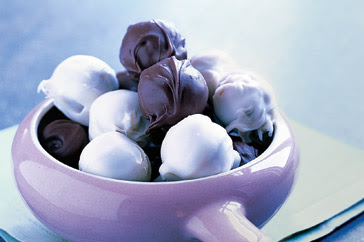 Want to cook authentic Turkish dishes at home, but don't know what to use? This guide to the basic ingredients used in Turkish cuisine is a great place to start!
Want to cook authentic Turkish dishes at home, but don't know what to use? This guide to the basic ingredients used in Turkish cuisine is a great place to start!1 Rosewater
A common flavour in Turkish delight and other sweets, rosewater has a gentle, floral scent and adds an exotic note to custard, rice pudding and even ice-cream.
2 Burghul
More common than rice in some parts of Turkey, cracked wheat, or burghul, is steamed with onions, tomato or capsicum paste and other ingredients to make a simple, healthy pilav to serve with sauced dishes.
3 Tahini
Tahini, or sesame paste, is used in Turkish sauces and dips. It’s also mixed with grape molasses as a sweet spread.
4 Tomato paste
Although fresh tomatoes are preferred, tomato paste is also used to give a strong, fruity taste to stews and casseroles.
5 Yoghurt
Continental-style yoghurt is central to Turkish cooking. It’s used as an accompaniment to grilled meats and as the base for all sorts of dips and sauces.
6 Filo
For savoury and sweet pastries, such as börek and baklava, Turks use filo pastry or a finer handmade version known as yufka.
7 Walnuts, almonds and pistachios
Nuts are used in sweet pastries and pilavs, but also in tarator made with yoghurt, tahini and ground nuts.
8 Feta
Turkish cooking uses sheep and goats milk cheeses, that are similar to salty, creamy feta.
9 Paprika
Paprika is a slightly spicy red powder which gives instant zing to many Turkish dishes.
Kitchen staples
Keep these ingredients handy for making traditional Turkish fare in your own kitchen.
Fresh parsley, dill and mint are served with Turkish pizzas known as lahmacun. Fresh herbs are also used in dips and salads and on the mezze platter.
Tomatoes, eggplants, onions, zucchini, cucumber and garlic are the main vegetables found in Turkish cooking. They’re used in everything from dips and salads to fritters and casseroles. Eggplants and zucchini are also often stuffed and grilled.
Capsicum is another vegetable used regularly in Turkish cuisine. It’s added to casseroles, stuffed
and grilled, or used to make biber salca, a hot roast capsicum paste that’s an essential ingredient
in sauces and pilavs.
Source: Good Taste - June 2008, Page 100

0 comments:
Post a Comment